Related Research Articles

Nigeria, officially the Federal Republic of Nigeria, is a country in West Africa. It is situated between the Sahel to the north and the Gulf of Guinea to the south in the Atlantic Ocean. It covers an area of 923,769 square kilometres (356,669 sq mi), and with a population of over 218 million, it is the most populous country in Africa, and the world's sixth-most populous country. Nigeria borders Niger in the north, Chad in the northeast, Cameroon in the east, and Benin in the west. Nigeria is a federal republic comprising 36 states and the Federal Capital Territory, where the capital, Abuja, is located. The largest city in Nigeria is Lagos, one of the largest metropolitan areas in the world and the second-largest in Africa.
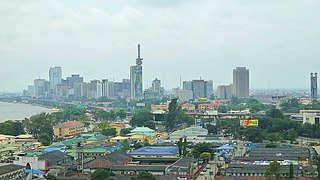
The Economy of Nigeria is a middle-income, mixed economy and emerging market, with expanding manufacturing, financial, service, communications, technology, and entertainment sectors. It is ranked as the 27th-largest economy in the world in terms of nominal GDP, and the 24th-largest in terms of purchasing power parity. Nigeria has the largest economy in Africa. The country's re-emergent manufacturing sector became the largest on the continent in 2013, and it produces a large proportion of goods and services for the region of West Africa. In addition, the debt-to-GDP ratio was 16.075% as of 2019.

Nigeria’s transport network has expanded in recent years to accommodate a growing population. The transport and storage sector was valued at N2.6trn ($6.9bn) in current basic prices in 2020, down from N3trn ($8bn) in 2019, according to the National Bureau of Statistics (NBS). This was reflected in a lower contribution to GDP, at 1.8% in the fourth quarter of 2020, down from 2.1% during the same period the previous year but higher than the 0.8% recorded in the third quarter of 2020. One of the most significant challenges facing the sector is meeting the needs of both large coastal cities and rural inland communities in order to fully unlock the country’s economic potential. This is especially the case with mining and agriculture, both of which are expected to benefit from two large-scale projects: the Lekki Port in Lagos and the Kano-Maradi rail line in the north of the country.

The Economic Community of West African States is a regional political and economic union of fifteen countries located in West Africa. Collectively, these countries comprise an area of 5,114,162 km2 (1,974,589 sq mi), and in 2015 had an estimated population of over 349 million.
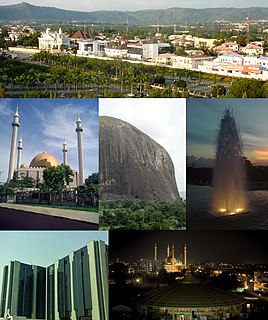
Abuja is the capital and eighth most populous city of Nigeria. Located in the centre of the country within the Federal Capital Territory (FCT), it is a planned city built mainly in the 1980s based on a master plan by International Planning Associates (IPA), a consortium of three American planning and architecture firms made up of Wallace, Roberts, McHarg & Todd as the lead, Archisystems International, and Planning Research Corporation. The Central Business District of Abuja was designed by Japanese architect Kenzo Tange. It replaced Lagos, the country's most populous city, as the capital on 12 December 1991.

Lagos is the largest city in Nigeria and the second most populous city in Africa, with a population of 15.4 million as of 2015 within the city proper. Lagos was the national capital of Nigeria until December 1991 following the government's decision to move their capital to Abuja in the centre of the country. The Lagos metropolitan area has a total population of roughly 23.5 million as of 2018, making it the largest metropolitan area in Africa. Lagos is a major African financial centre and is the economic hub of Lagos State and Nigeria at large. The city has been described as the cultural, financial, and entertainment capital of Africa, and is a significant influence on commerce, entertainment, technology, education, politics, tourism, art, and fashion. Lagos is also among the top ten of the world's fastest-growing cities and urban areas. The megacity has the fourth-highest GDP in Africa and houses one of the largest and busiest seaports on the continent. The Lagos metropolitan area is a major educational and cultural centre in Sub Saharan Africa.
A free-trade zone (FTZ) is a class of special economic zone. It is a geographic area where goods may be imported, stored, handled, manufactured, or reconfigured and re-exported under specific customs regulation and generally not subject to customs duty. Free trade zones are generally organized around major seaports, international airports, and national frontiers—areas with many geographic advantages for trade.

Onitsha is a city located on the eastern bank of the Niger River, in Anambra State, Nigeria. A metropolitan city, Onitsha is known for its river port and as an economic hub for commerce, industry, and education. It hosts the Onitsha Main Market, the largest market in Africa in terms of geographical size and volume of goods.

Lagos State is a state in southwestern Nigeria. Of the 36 states, it is both the most populous and smallest in area. Bounded to the south by the Bight of Benin and to the west by the international border with Benin Republic, Lagos State borders Ogun State to the east and north making it the only Nigerian state to border only one other state. Named for the city of Lagos—the most populous city in Africa—the state was formed from the Western Region and the former Federal Capital Territory on 27 May 1967.

Jigawa State (Hausa: Jihar Jigawa is one of the 36 states of Nigeria, located in the northern region of the country. Created in 1991 from the northeastern-most region of Kano State, Jigawa State is located on the border with Nigeria's national border with the Republic of the Niger. The state capital and largest city is Dutse. Jigawa state has 27 local governments

Aliko Dangote is a Nigerian billionaire business magnate. Dangote is the founder and current chairman and CEO of the Dangote Group, the largest industrial conglomerate in West Africa. According to Forbes and Bloomberg Billionaires Index, Dangote's net worth is estimated at US$19.6 billion as of 20 August 2022, making him the richest person in Africa, richest black person and the 75th richest person in the world.

Corruption is an anti-social attitude awarding improper privileges contrary to legal and moral norms and impairs the authorities' capacity to secure the welfare of all citizens. Corruption in Nigeria is a constant phenomenon. In 2012, Nigeria was estimated to have lost over $400 billion to corruption since its independence. In 2021, the country ranked 154th in the 180 countries listed in Transparency International's Corruption Index.
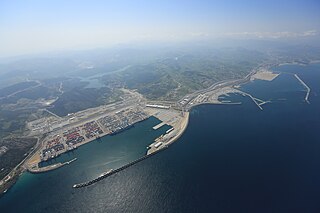
Tanger Med is a Moroccan industrial port complex, located 45 km northeast of Tanger and opposite of Tarifa, Spain on the Strait of Gibraltar, with handling capacities of 9 million containers, 7 million passengers, 700,000 trucks and the export of 1 million vehicles.

The bilateral relations between the Federal Republic of Nigeria and People's Republic of China were formally established on February 10, 1971 - a decade after Nigeria gained its independence from the British Empire. Relations between Nigeria and China have expanded on growing bilateral trade and strategic cooperation. China is considered one of Nigeria's closest allies and partners. China is also one of Nigeria's important trading and export partners. According to a 2014 BBC World Service Poll, 80% of Nigerians view China's influence positively, with only 10% expressing a negative view, making Nigeria the most pro-Chinese nation in the world.
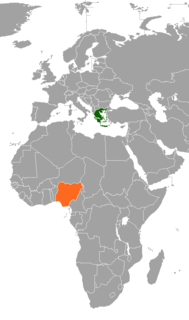
Greece–Nigeria relations include diplomatic and economic relations between Greece and Nigeria. Nigeria has an embassy in Athens. Greece established a diplomatic mission in Nigeria in 1970, and today has an embassy in Abuja and a consulate in Lagos. Trade between the two countries is imbalanced, with imports from Greece to Nigeria exceeding exports. Greek-owned tankers have an important role in shipping Nigerian oil and natural gas, its main exports. Recently a Greek tanker was involved a dispute over crude oil smuggling. Greek-controlled companies have invested US$5 billion in the Nigerian economy. There is a small Greek business community in Lagos.
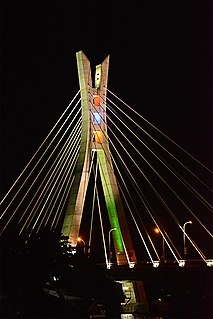
Lekki is a city in Lagos State, Nigeria. It is located to the south-east of Lagos city. Lekki is a naturally formed peninsula, adjoining to its west Victoria Island and Ikoyi districts of Lagos, with the Atlantic Ocean to its south, Lagos Lagoon to the north, and Lekki Lagoon to its east; however, the city's southeast, which ends around the western edge of Refuge Island, adjoins the eastern part of Ibeju-Lekki LGA.

Oluyemi Oluleke Osinbajo is a Nigerian lawyer, professor, and politician who is the 14th and current Vice President of Nigeria since 2015. A member of the All Progressives Congress (APC), he previously served as Attorney General of Lagos State from 1999 to 2007 and holds the title of Senior Advocate of Nigeria. In April 2022, he announced his intention to run for the APC nomination for President of Nigeria in the 2023 presidential election. He was third in the APC presidential primaries held in June 2022 with a total votes of 235 from the delegates.
Mukhail Adetokunbo Abiru, FCA popularly called Tokunbo Abiru is a Nigerian Banker and Politician. He is the Senator representing the Lagos East Senatorial district at the 9th Nigerian National Assembly. He was the Group Managing Director/Chief Executive Officer of Polaris Bank Limited, Nigeria. He attended the six-week Harvard Business School Advanced Management Program and Lagos Business School. He holds a B.Sc (Economics) from Lagos State University and is a Fellow of The Institute of Chartered Accountants of Nigeria (ICAN) and an Honorary Senior Member of The Chartered Institute of Bankers of Nigeria (CIBN). On 24 August 2020, Abiru resigned from Polaris Bank to contest the Lagos East senatorial election under the platform of All Progressives Congress

Peter Ndubuisi Mbah is a Nigerian maritime Lawyer, a financial analyst, and politician. He is the founder and Chief Executive Officer of Pinnacle Oil and Gas Ltd. Mbah is a native of Owo in Nkanu East Local Government Area (LGA) of Enugu state, Nigeria. He is a Fellow of the Certified Institute of Public Administration and Management (CIPM), a member of the Nigerian Institute of International Affairs and Nigerian Bar Association.
References
- ↑ "Lagos Free Zone to attract additional $5bn investment in 4 years". Businessday NG. 2021-03-23. Retrieved 2022-04-22.
- ↑ "Lagos Free Zone to boost Nigeria's GDP by 2 percent". The Guardian Nigeria News - Nigeria and World News. 2020-11-24. Retrieved 2022-04-22.
- ↑ "Lagos Free Zone Company floats N10.5bn corporate infrastructure bonds". Vanguard News. 2021-09-19. Retrieved 2022-04-22.
- ↑ Mugano, Gift (2021). Special Economic Zones: Economic Development in Africa. Springer Nature. ISBN 978-3-030-82311-5.
- ↑ Mugano, Gift (2021). Special Economic Zones. doi:10.1007/978-3-030-82311-5. ISBN 978-3-030-82310-8. S2CID 243814353.
- ↑ "Regional Development and Industrialization". springerprofessional.de. Retrieved 2022-04-22.